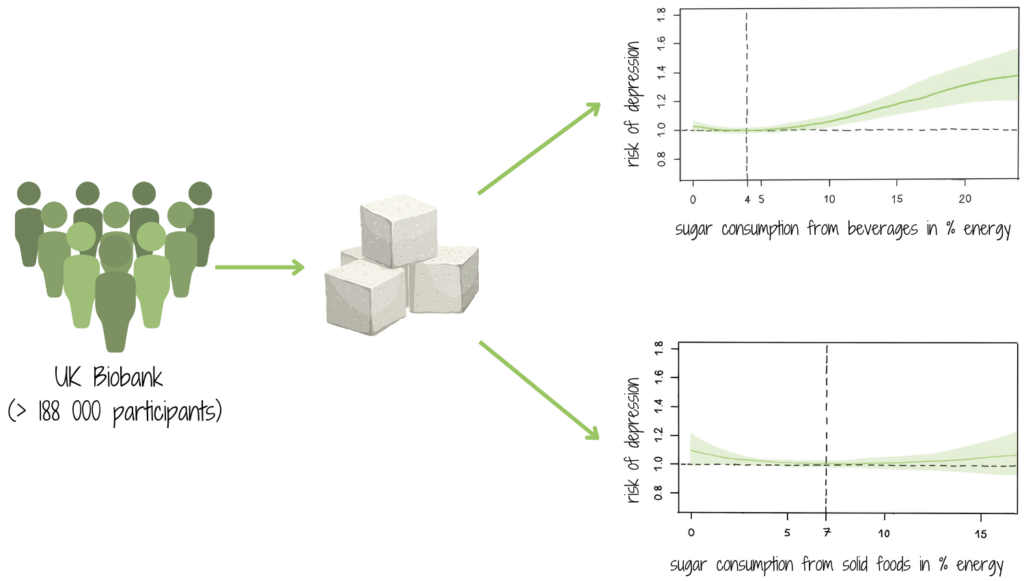
Major points:
- A scientific study by the Neatic team analyzed data from over 188,000 individuals to determine if overall sugar intake, as well as sugar from specific foods, is associated with the risk of depression.
- Free sugars from beverages increased the risk of depression steadily beyond 5% of total energy intake (upper figure), while no significant association was found for free sugars from solid foods (lower figure). Naturally occurring intrinsic sugars in fruits, vegetables, and milk were not linked to the risk of depression.
- This study supports Neatic’s approach of limiting only free sugars. Further research is needed to clarify the extent to which free sugars from beverages may be particularly harmful.
What do we know about sugar?
The term “sugar” includes both free and intrinsic sugars.
Free sugars, as defined by the World Health Organization (WHO), include all sugars that manufacturers or consumers add to foods, as well as sugars naturally present in honey, syrups, fruit juices, and fruit juice concentrates.
Intrinsic sugars are those naturally found in whole fruits and vegetables, as well as lactose in milk and dairy products.
According to the WHO, negative health effects have been observed so far only for free sugars.
What does the study examine?
Depression is one of the most common mental disorders, affecting approximately 3.8% of the global population. In addition to risk factors such as being female or experiencing traumatic events, diet plays an important role in the development of the disease.
Current research suggests that high sugar consumption may be a potential risk factor for developing depression. A scientific study by the Neatic team examined whether there is a connection between overall sugar intake, as well as sugar consumption from specific foods, and the risk of depression.
The data used to answer this research question came from the UK Biobank study, a large-scale study in the United Kingdom that recruited more than 500,000 participants between 2006 and 2010. For the study by the Neatic team, data from over 188,000 UK Biobank participants were analyzed. At the time of analysis, more than 5,410 participants had been diagnosed with depression. All included participants completed a web-based 24-hour dietary recall questionnaire which covered 206 foods and 32 beverages.
Based on the dietary records, the daily intake of free and intrinsic sugars, as well as the intake of free sugars from specific foods, was calculated for each participant. Statistical analyses were then used to assess the risk of developing depression in relation to daily sugar consumption.
In addition to sugar consumption, other factors influencing depression risk, such as age, sex, income, and education, were taken into account.
What did the study find?
The consumption of free sugars showed a clear association with the risk of depression. Statistically, the risk of depression increased steadily with an intake of 10% of total energy (%E) from free sugars. In contrast, no significant connection was found between intrinsic sugars and the risk of depression.
Examining free sugars from beverages and solid foods revealed that sugary drinks were also strongly associated with depression risk. Beyond an intake of 5%E from free sugars, the risk of depression increased steadily (upper figure). In comparison, no significant association was found between free sugars from solid foods and depression risk (lower figure).
Furthermore, the Neatic study analyzed four categories of beverages:
- Sugar-sweetened beverages: A steady increase in depression risk was observed with an intake exceeding 5%E. This corresponds to approximately 25 g of free sugars or 250 ml of a typical soft drink.
- Juices: The statistically lowest risk was found at 5%E, equivalent to about 280 ml of orange juice. In comparison, consuming 0%E from free sugars in juice increased the risk of depression by 12%.
- Sweetened milk drinks: The lowest risk of developing depression was at 0%E, while the highest risk was at 3%E, corresponding to about 15 g of free sugars or 80 ml of a vanilla shake. At this amount, the risk of depression was increased by 21%.
- Sweetened tea and coffee: The statistically lowest risk was also at 0%E.
What does Neatic recommend concerning sugar and depression?
This study supports the approach of Neatic, as well as the recommendations of the WHO and several professional organizations (e.g., the German Nutrition Society), to reduce free sugars in the diet.
Based on the data from this study, it appears that, in terms of depression risk, there is a difference between consuming free sugars from beverages versus solid foods. Further research is needed to determine to what extent free sugars from beverages – particularly those in sugar-sweetened beverages, sweetened milk drinks, and sweetened tea and coffee – may be especially harmful.
Want to know more about the association between sugar and the risk of dying? Click here to find out more.
Bibliography:
Deutsche Gesellschaft für Ernährung e.V. (2018): Quantitative Empfehlung zur Zuckerzufuhr in Deutschland. Available online at https://www.dge.de/wissenschaft/stellungnahmen-und-fachinformationen/stellungnahmen/quantitative-empfehlung-zur-zuckerzufuhr-in-deutschland/, checked on 1/24/2024.
Kaiser, Anna; Schaefer, Sylva M.; Behrendt, Inken; Eichner, Gerrit; Fasshauer, Mathias (2022): Association of sugar intake from different sources with incident depression in the prospective cohort of UK Biobank participants. Eur J Nutr 62 (2), pp. 727–738. DOI: 10.1007/s00394-022-03022-7.
World Health Organization (2021): Depression. Key Facts. Available online at https://www.who.int/news-room/fact-sheets/detail/depression, checked on 3/30/2023.
World Health Organization (2015): Guideline: sugars intake for adults and children. Available online at https://www.who.int/publications/i/item/9789241549028, checked on 3/30/2023.
